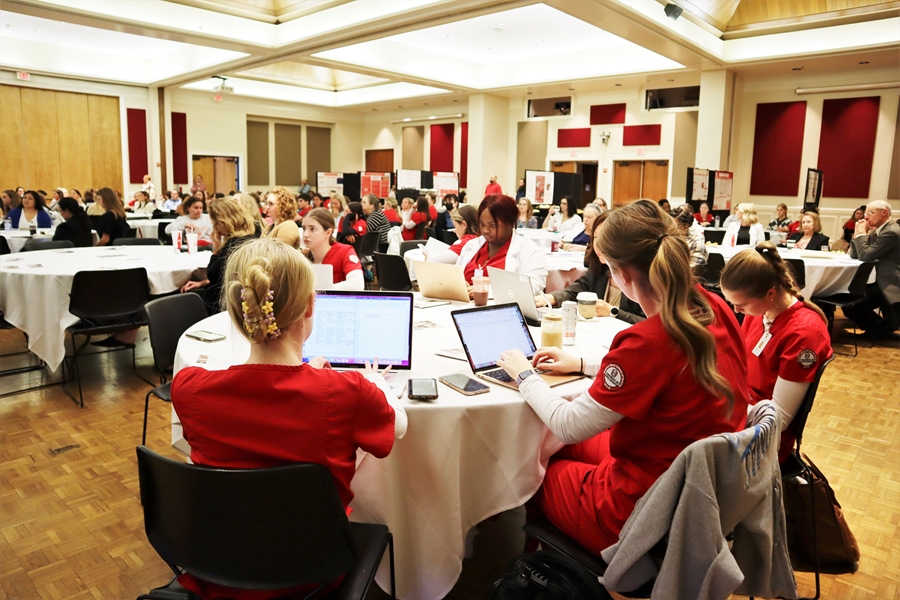
National Nurses Week kicked off on Saturday, and the U of A Eleanor Mann School of Nursing is celebrating its students and faculty.
The American Nurses Association chose the "You Make A Difference" theme this year to encourage nurses, other healthcare professionals, employers, community leaders and the public to recognize and promote America's nurses' vast contributions and positive impact.
The association notes that the need for nurses is more crucial than ever because of the aging American population, emerging health challenges, the continuing expansion of life-sustaining technologies and the explosive growth of home healthcare services. More qualified registered nurses are needed in the future to meet the increasingly complex needs of healthcare consumers.
"National Nurses Week is the perfect opportunity to pause and honor our nursing faculty and students," said College of Education and Health Professions Dean Kate Mamiseishvili. "I want to thank our faculty for their devotion to our students, who go on to invest in local and global communities. We are all indebted to nurses."
The nursing school, led by new executive director Jessie Casida, Ph.D., R.N., APN-C, FAAN, has been involved in a host of activities recently to advance the nursing field and to enhance students' knowledge.
In late April, the school hosted an inaugural Nursing Science Day. The symposium featured nationally and internationally known nurse scientist speakers. The keynote speaker was Elizabeth Tarlov, Ph.D., R.N., director of the National Institute of Nursing Research's Division of Extramural Science Programs at the National Institutes of Health. Students from other disciplines and area healthcare professionals were invited to participate. They, along with online and on-campus students, presented posters framed by the theme, "Optimizing and transforming health and healthcare delivery outcomes through nursing discovery, research and scholarship."
Other speakers included Anne Sales, Ph.D., R.N., a professor in the Sinclair School of Nursing and the Department of Family and Community Medicine in the School of Medicine at the University of Missouri (Columbia), and Monica Wagner, Ph.D., R.N., an assistant professor in the Frances Payne Bolton School of Nursing at Case Western Reserve University in Cleveland. Casida also presented research at the event.
The nursing school also recently hosted Dr. Ken Dion, a prominent nursing scientist with expertise in the business of healthcare. Dion is the Sigma Theta Tau International president and assistant dean at Johns Hopkins School of Nursing. He spoke to faculty on the role of the academic nurse leader, the business of healthcare and enhancing the nursing profession. Dion was also the keynote speaker at the member induction ceremony for the U of A Sigma Theta Tau International Pi Theta Chapter. The event celebrated community nurse leaders and nursing students who have demonstrated academic and clinical excellence. The honor society recognizes superior achievement in nursing, recognizes the development of leadership qualities, fosters high professional standards in the field and strengthens commitment to the ideals and purposes of the profession.
Another guest speaker event, held on May 2, focused on nursing diversity and inclusion. Edward Halloran, Ph.D., is chair of the American Association for Men in Nursing. The nursing school recently formed a U of A chapter of the association. One of the association's goals is to encourage men of all ages to become nurses and join all nurses in strengthening and humanizing health care. The number of male nurses in Arkansas is below the national average.
Halloran discussed his research, which he started at Yale, concerning the classification of patients by nurses and physicians using standard terms. He found a classification developed by the International Council of Nurses in the writings of Virginia Henderson and promotes the use of it by nurses to keep digital records on the human function of their patients for themselves and for Electronic Health Record systems.
Halloran has administered nursing services in Connecticut, Chicago and Cleveland and taught nursing at Case-Western Reserve University and the University of North Carolina at Chapel Hill.
All events were funded by the college's WE CARE initiative.
Topics
Contacts
Shannon G. Magsam, director of communications
College of Education and Health Professions
479-575-3138,